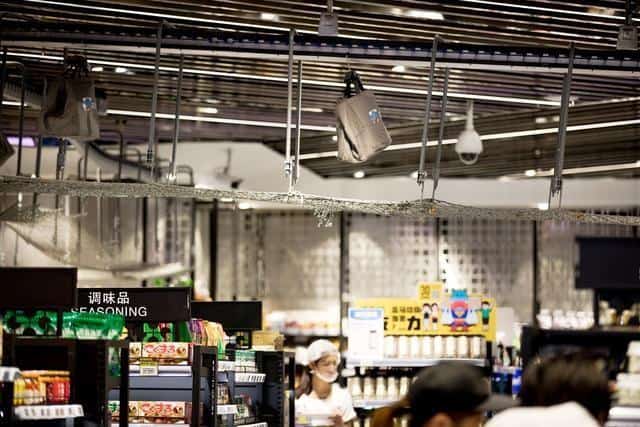Chinese consumers are, if anything, more bonded to their smartphones than their U.S. counterparts, and a startup supermarket chain in China is catering to these mobile-obsessed shoppers.
Hema, partly funded by Chinese e-commerce giant Alibaba Group Holding Ltd., has opened 20 grocery stores in five cities in the past two years. All products carry QR codes and a consumer can scan a code to receive product information and recommendations of related items.
Checkout is solely by Alipay, the payment system operated by Alibaba affiliate Ant Financial, that Chinese consumers overwhelmingly use by scanning their smartphones at checkout. According to a recent survey by Ipsos, 77% of Chinese consumers use mobile payment systems like Alipay or Tencent’s TenPay and WeChat Pay. That was the highest penetration of mobile payments among all the countries in the survey.
Consumers also can order products from Hema’s mobile app.
Each Hema store serves as a fulfillment center for online shoppers living within three kilometers (about 1.5 miles). Hema says it can deliver to those consumers in 30 minutes and does not charge them for shipping. The retailer says each store normally receives several thousand orders each day, and 70% of its sales are online.
“We aren’t not just a grocery store. We operate like a mobile company,” a Hema spokeswoman tells Internet Retailer. “The store can bring us plenty of traffic for our app, and our sales will increase as our app increases connection with consumers by sending coupons and products recommendations.”

Chinese shoppers pick up online orders at a Hema grocery store.
Hema’s consumers order online an average of 4.5 times per month, and the conversion rate at Hema’s e-commerce site, freshhema.com, is 35%. Both metrics far exceed those of a typical web-only retailer, Hema says.
Online orders can be picked up in stores. Hema stores also operate cafeterias, and one store in Shanghai can accommodate 500 diners.
To guarantee freshness, produce and other fresh food is only on stores shelves for one day, Hema says. The company offers its own brand of fresh food and plans to expand into other merchandise categories, such as apparel and health products.
While Hema does not disclose its sales, Chinese investment firm Huatai Securities estimated that one of its Shanghai stores generated 250 million yuan ($38 million) in sales in 2016.
Alibaba reportedly has invested tens of millions of dollars in Hema, but the companies have not disclosed what percentage of the supermarket chain Alibaba owns.
Favorite
